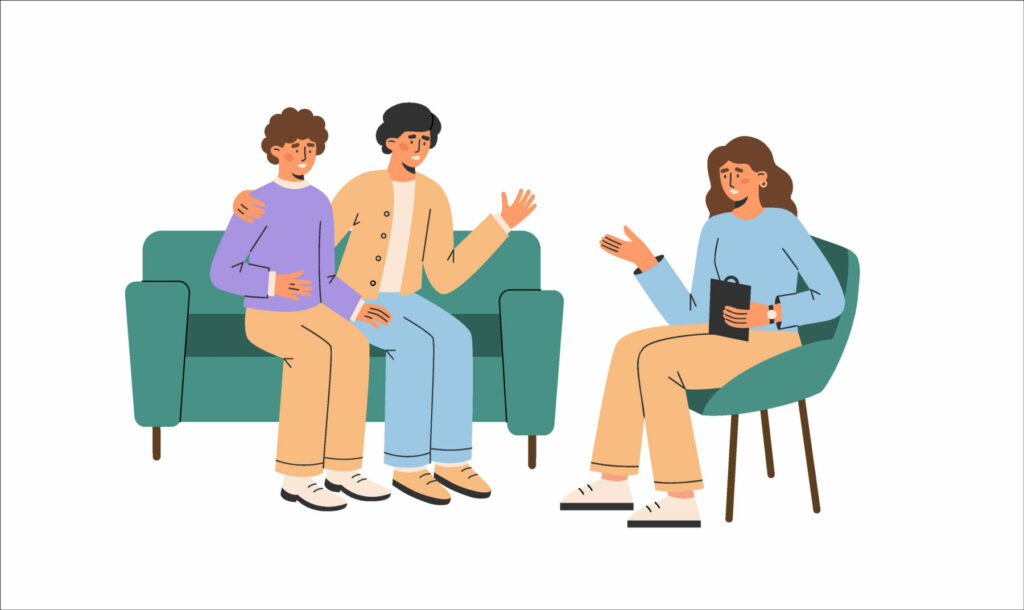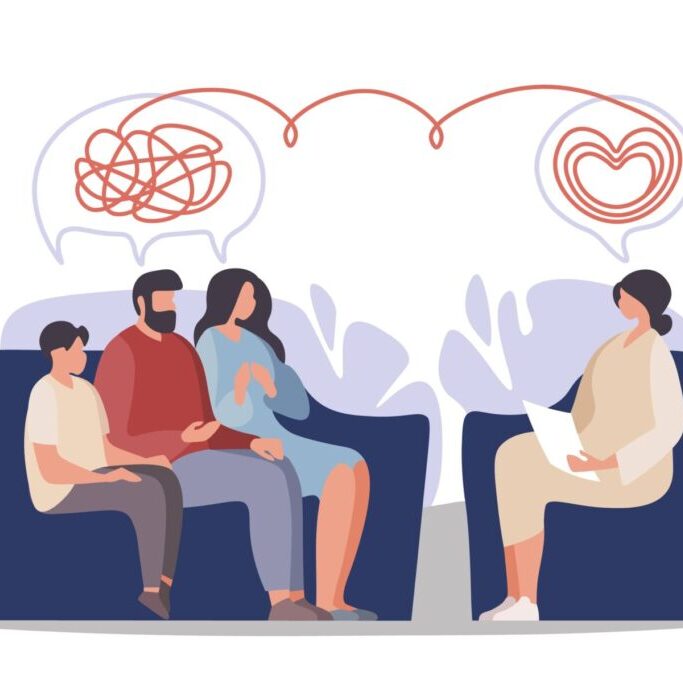Understanding the Unique Needs of LGBTQ+ Couples Therapy

Seeking out and locating a queer-affirming mental health counselor or therapist can require effort and persistence. Plenty of therapists in Chicago are trained to consider the uniqueness of their clients, and many intentionally welcome clients’ sexual orientations and relationships into the counseling space.
However, not all queer-affirming counselors and therapists have the necessary competence or skills to effectively work with LGBTQ+ couples. The unique lives and relationships of queer people warrant mental health professionals who hold specialization or experience in LGBTQ couples therapy, and who can more fully understand the struggles and tailor interventions to address specific needs.
Queer families, including those in which one or more persons identify as queer or LGBTQIA+, experience unique stressors in relationships and as families. Whether you are in a monogamous relationship with one person or if you have multiple partners, navigating relationships is often rife with intense emotions and boundaries.
These long-term bonds may also result in children or the blending of families. LGBTQ couples counseling and therapy require unique perspectives and skills from knowledgeable mental health and relationship professionals. A skilled LGBTQIA+ therapist can help partners in queer relationships navigate these challenges effectively.
If you find yourself seeking out or are curious about LGBTQ couples therapy, there are some common areas you can expect to address or explore. While not an exhaustive or fully complete list, your LGBTQIA+ therapist or counselor may want to explore:
Your Identity Development(s)
Over time, all of us develop several identities – for example, mother, partner, artist, queer – that are impactful for the way we structure our daily lives and situate ourselves within relationships. Knowing where any individual client is with their own identity development is an essential area of clinical focus and treatment.
For LGBTQ+ persons, coming to terms with their sexual and/or gender identity are important psychological and emotional processes. It is important you and your LGBTQIA+ therapist understand where you are in this process. Identity development includes internal processes like recognizing and accepting your identity and, for many, making public declarations and living authentically.
Identity development also includes integrating these identities together in a way that makes sense for the individual. For couples in interracial relationships, you and your couples’ counselor may also want to explore racial identity and the impact of race as an important identity. (More below about experiences of discrimination.)
Understanding individual identity development can impact the dynamics of relationships, as many couples continue to blend extended families and social networks. Self-acceptance, integration, and outness are all part of identity development that can directly impact how you and a partner engage relationally.
LGBTQ couples therapy will also often explore their identity as partners and within the relationship itself. Often referred to as the level or sense of “We-ness,” a couple’s identity as a couple is an essential area of discussion for initial and ongoing conversations. You will likely be asked to “tell the story” of how you met and started the relationship.
Discrimination, Marginalization, and Stigma
Despite ongoing and increasing acceptance of queer people and relationships, many still face discrimination and stigma. The Minority Stress Model is one way to understand how ongoing stress stemming from discrimination and stigma has been positively correlated to increased chronic illness, substance use, and negative mental health outcomes.
These co-occurring health conditions can have a negative impact on areas of daily functioning, finances, career, and relationships – all areas of health and wellness. Your LGBTQ couples counselor or therapist will want to explore and address how you as a couple are managing these and other stressors.
Queer relationships in which one or more partners are a person of color may experience discrimination for their multiple identities. This kind of discrimination based on intersecting identities has an exponential effect on the negative health outcomes for an already marginalized person. When one or any member of a queer relationship experiences marginalization or discrimination, the ripple effect into aspects of health can be significant.
Discrimination and stigma can also have internalizing effects on individuals. For example, those who struggle with aspects of their identity development or experience higher levels of discrimination may, over time, develop internalized homonegativity.
Internalized homonegativity (also called internalized homophobia) occurs when a person turns and directs negativity towards themselves and others. Many who experience this kind of internalized homonegativity often struggle to make connections with others, struggle with aspects of sexuality, or hold generally negative sentiments towards other LGBTQ+ persons. Your LGBTQIA+ therapist will want to explore how experiences of marginalization have impacted you individually and as a couple over time.
Relationship Attachment Patterns and Communication
One area of clinical focus often interwoven through LGBTQ couples counseling includes attachment patterns. In infancy and childhood, our primary emotional needs are typically met through parents or other caretakers. Over time, the way we learn the patterns of emotional communication from our attachment figures is unconsciously applied to our relationships with others.
You and your couples counselor are likely to explore family-of-origin dynamics, which can include memorable emotions and experiences, (if any) sibling relationships, trauma, family history of mental illness or addictions, and relationships with parents.
LGBT children whose parents or family were not accepting or tolerant of their queerness may experience attachment in different ways or have unique patterns of attachment. Be ready for an exploration of how each of your families of origin encountered and welcomed (or not) a queer family member.
These histories can indicate how emotional needs were met and how communication patterns around emotional needs were created and maintained. Couple’s treatment modalities, like Emotion Focused Therapy (EFT), are premised on the foundation that our emotions and emotional patterns with our partners are learned as part of our attachment bonds with caregivers.
If your attachment to a caregiver felt “contingent” on how authentic you could be, this pattern may be evident within your relationship with a partner. LGBTQ couples therapy is also likely to discuss some of your past relationships to help identify these patterns.
Trauma and Negative Impactful Experiences
It is an unfortunate reality that many LGBTQIA+ people experience trauma in a multitude of ways and at various points in life. Queer youth experience bullying and homelessness more than heterosexual and cisgender youth. Sexual trauma and abuse are also common experiences for trans people.
There may be a time in your LGBTQ couples therapy when you or your partner may need additional focus to address any post-trauma impact. Depending on your provider and their approach, you or your partner may be referred out for individual counseling to help increase support and growth.
Daily Stressors
It may also be the case that you and a partner simply need better communication skills to be more expressive and understanding. In these cases, any well-qualified relationship counselor can provide effective care. However, it can still be in your interest to seek out an LGBTQ couples counselor who “knows the lingo” and can foster authentic interactions.
If you and your partner are navigating the complexities of LGBTQIA+ relationships and seeking a deeper connection, support, or guidance, Tandem Psychology is here to help. Our team of experienced, queer-affirming therapists specializes in LGBTQ couples therapy, providing a safe, welcoming space to explore your unique needs.
At Tandem Psychology, we understand the importance of addressing identity development, relationship dynamics, and the impact of discrimination and stigma on your partnership. We are committed to offering personalized, compassionate care that fosters growth and healing.
Take the next step in strengthening your relationship by scheduling an appointment with one of our LGBTQIA+ therapists in Chicago today. Whether you’re looking to improve communication, resolve conflict, or build a more fulfilling relationship, Tandem Psychology is here to support you every step of the way. Reach out to us now and begin your journey toward a healthier, more connected partnership.
This blog is made for informational and educational purposes only. It is not medical advice. The information in this blog is not intended to (1) replace a one-on-one relationship with a qualified licensed health care provider, (2) create or establish a provider-patient relationship, or (3) create a duty for us to follow up with you.



